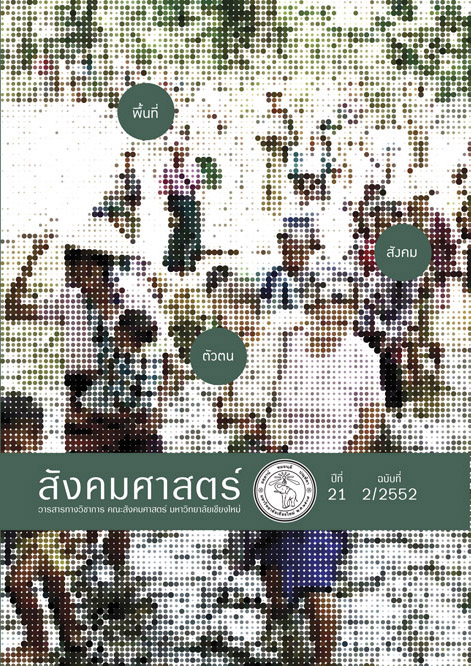Dynamics and Negotiation of “Rights” to Resource Management: A Case Study in the Pwo Karen Nong Lak Community, Thung Hua Chang District, Lamphun Province
Main Article Content
Abstract
This paper aims to open up and stimulate study on rights to access and resource management, particularly, to acknowledge community rights as a method of sustainable resource management. The paper traces conflicts between regimes of rights, namely state rights, private rights and community rights. The articulation of regimes of rights has created new rules and regulations as “partially private property rights”. In order to allocate resources legitimately, partially private property rights emphasize complexity of rights through different integrated levels including rights to use, rights to manage, and rights to control.
Not only do Pwo Karen in Nong Lak community construct their resource management based on a complexity of rights, but they also redefine the meaning of rights and assert their identities, their community and their ethnicity as “Karen”. Moreover, they create several levels of their image. For example, at the community level the discussions of villagers’ ideas create the village’s image as forest guardians, or “Developed Karen community”. This image has a symbolic power which the community uses to shift their new social movement, express their culture, and influence policy. At individual and household levels, villagers try to decrease the density of forest land use by working in non-agricultural sectors and practicing alternative agriculture.
Article Details
All written articles published on Journal of Social Sciences is its author’s opinion which is not belonged to Faculty of Social Sciences, Chiang Mai University or is not in a responsibility of the journal’s editorial committee’s members.
References
กำธร ธิฉลาด (บก.). 2536. “ข้อมูลทั่วไปจังหวัดลำพูนด้านทรัพยากรธรรมชาติและสิ่งแวดล้อม” เอกสารชุดสิ่งแวดล้อมลำาดับที่ 5 สำานักงานพัฒนาชุมชน จังหวัดลำพูน.
เจิมศักดิ์ ปิ่นทอง และคณะ. 2533 .วิวัฒนาการของการบุกเบิกที่ดินทำกินในเขตป่า.กรุงเทพฯ สถาบันวิจัยเพื่อการพัฒนาประเทศไทย.
ฉลาดชาย รมิตานนท์. 2528. ป่าไม้กับสังคมกับการพัฒนาชนบท. กรุงเทพฯ: โครงการศึกษานโยบายสาธารณะ สมาคมสังคมศาสตร์แห่งประเทศไทย.
ประเสริฐ ตระการศุภกร. 2540. “การสืบทอดองค์ความรู้เกี่ยวกับระบบการทำาไร่หมุนเวียนของชนเผ่ากะเหรี่ยง” วิทยานิพนธ์ศึกษาศาสตรมหาบัณฑิต สาขาวิชาการศึกษานอกระบบ มหาวิทยาลัยเชียงใหม่.
ปิ่นแก้ว เหลืองอร่ามศรี. 2539. ภูมิปัญญานิเวศวิทยาชนพื้นเมือง: ศึกษากรณีชุมชนกะเหรี่ยงทุ่งใหญ่นเรศวร. กรุงเทพฯ: สำานักพิมพ์โลกดุลยภาพ.
สหพันธ์เกษตรกรภาคเหนือและเครือข่ายองค์กรประชาชนภาคเหนือ. 2545. “เอกสารประกอบการประชุมสรุปผลการดำาเนินการแก้ไขปัญหาที่ดิน-ป่าไม้ตามมติคณะรัฐมนตรี” วันที่ 9 เมษายน พ.ศ. 2545 ณ มูลนิธิพัฒนาภาคเหนือ.
เสน่ห์ จามริก และ ยศ สันตสมบัติ (บก.) 2536. ป่าชุมชนในประเทศไทย:แนวทางการพัฒนา กรุงเทพฯ: สถาบันชุมชนท้องถิ่นพัฒนา
อานันท์ กาญจนพันธุ์. 2543. “สถานภาพการวิจัยชุมชนกับการจัดการทรัพยากร: บทสังเคราะห์การศึกษา” ใน อานันท์ กาญจนพันธุ์ (บก.) พลวัตชุมชนในการจัดการทรัพยากร: กระบวนทัศน์และนโยบาย. กรุงเทพฯ: สำนักงานกองทุนสนับสนุนการวิจัย.
อานันท์ กาญจนพันธุ์. 2544ก. มิติชุมชน: วิธีคิดท้องถิ่นว่าด้วย สิทธิ อำนาจและการจัดการทรัพยากร. กรุงเทพฯ: สำานักงานกองทุนสนับสนุนการวิจัย.
อานันท์ กาญจนพันธุ์. 2544ข. วิธีคิดเชิงซ้อนในการวิจัยชุมชน: พลวัตและศักยภาพของชุมชนในการพัฒนา. กรุงเทพฯ: สำนักงานกองทุนสนับสนุนการวิจัย.
อานันท์ กาญจนพันธุ์ และคณะ. 2547. “ระบบการเกษตรแบบไร่หมุนเวียน: สถานภาพและความเปลี่ยนแปลง เล่ม 1” รายงานการวิจัยประกอบการประชุมสัมมนาระดับชาติเรื่องไร่หมุนเวียนและนโยบายบนที่สูง วันที่ 18 มิถุนายน พ.ศ. 2547 ณ หอประชุมมหาวิทยาลัย เชียงใหม่.
Anan Ganjanapan. 2003. “Complexity of Right and Legal Pluralism in Participatory Watershed Development in Thailand” Proceeding of MMSEAIII, Lijiang Yunnan, China
Fortmann,Louise. 1995. “Talking Claim: Discursive Strategies in Contesting Property” World Development 23(6): 1053-1063.
Hinton, Peter. 1975. “Karen Subsistence: The Limits of a Swidden Economy in Thailand” Unpublished Ph.D. Thesis,University of Sydney.
Hyndman, D. and Levita Duhaylungsod. 1996. “Reclaiming T boli Land: An Ancestral Domain Claim in the Outern Phillippines” in Richard Howitt et. al (eds.) Resources, Nations and Indigenous People. (pp.104-120), Melbourne: Oxford University Press
Kunstadter, Peter; E.C Chapman and Sanga Sabhasri ( ed. ).1978. Farmers in the Forest: Economic Development and Marginal Agriculture in Northern Thailand. Honololo:TheEast-West Center, University of Hawaii Press.
Leach, Melissa; Mearns, Robin and Scoones, Ian. 1999. “Environmental Entitlement: Dynamics and Institution in Community – Based Natural Resource Management” World Development 27(2): 225-247.
Lund, Christian. 2000. “Negotiating Property Institution: On the Symbiosis of Property and Authority in Africa” in Kristine Juul and Christian Lund (eds.) Negotiating Property in Africa. (pp.11-44) Portsmouth, NH: Heinemann.
Moore, Donald. 1994. “Contesting Terrain in Zimbubwe Eastern Highland: Political Ecology Ethnography and Peasant Resource Struggles,” Economic Geography 69(4): 380-401.
Peluso, Nancy Lee. 1996. “Fruit Trees and Family Trees in an Anthropogenic Forest: Ethics of Access, Property Zone and Environment Change in Indonesia,” Comparative Studies in Society and History 38(3): 510-548.
Ribot, Jesse C. and Peluso Nancy Lee. 2003. “A Theory of Access,” Rural Sociology. 68:2.
Rocheleau, Dianne and David Edmunds. 1997. “Woman, Man and Trees: Gender, Power and Property in Forest and Agraian Landscapes,” World Development 25 (8): 1351-1371
Vandergeest,Peter. 1997. “Rethinking Property,” The Common Property Resource Digest 41-46.


